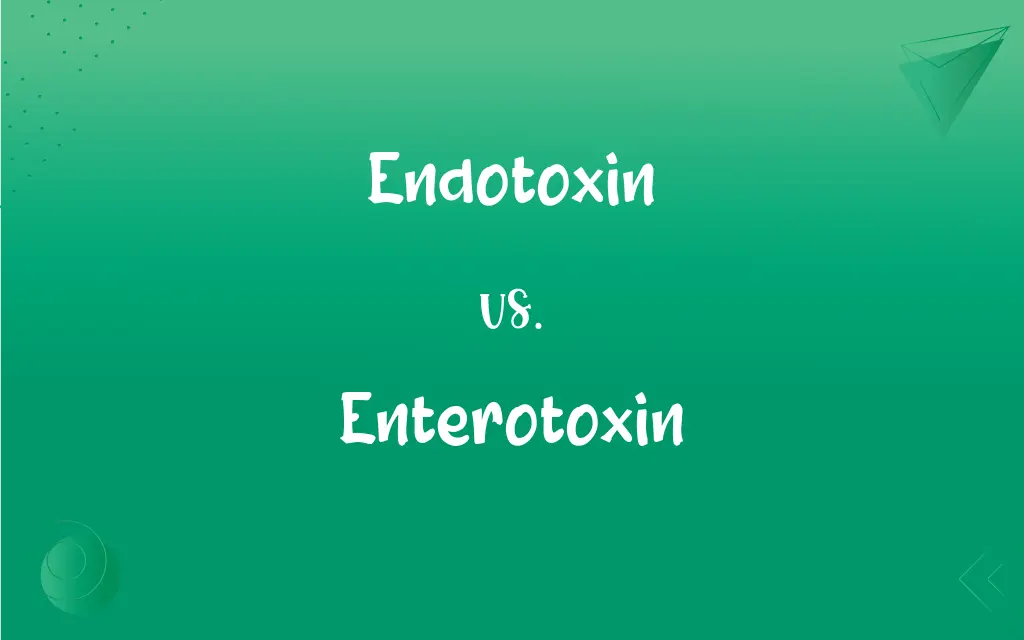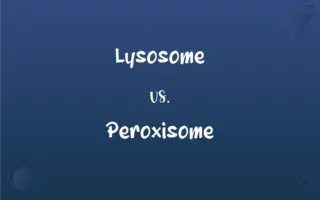Endotoxin vs. Enterotoxin: What's the Difference?
Edited by Aimie Carlson || By Harlon Moss || Published on December 27, 2023
Endotoxin is a toxin within bacterial cell walls, released upon cell death. Enterotoxin is a toxin produced by bacteria affecting the intestines.

Key Differences
Endotoxins are toxins present within the outer membrane of Gram-negative bacteria, released upon bacterial cell death. Enterotoxins, however, are toxins secreted by both Gram-positive and Gram-negative bacteria, specifically targeting the intestines.
Endotoxins are heat-stable, meaning they withstand high temperatures without losing toxicity. In contrast, enterotoxins are generally heat-labile, losing their toxic properties when exposed to heat.
The primary impact of endotoxins is systemic, potentially causing fever and septic shock. Enterotoxins primarily affect the gastrointestinal system, leading to symptoms like diarrhea and vomiting.
Endotoxins, being part of the bacterial cell structure, are released during bacterial lysis. Enterotoxins are actively secreted by living bacteria as part of their growth and metabolism.
Endotoxins are less potent and cause symptoms gradually, while enterotoxins are often more potent and can cause rapid onset of symptoms.
ADVERTISEMENT
Comparison Chart
Source
Part of Gram-negative bacterial cell walls
Secreted by both Gram-positive and negative bacteria
Stability to Heat
Heat-stable
Generally heat-labile
Primary Effect
Systemic effects like fever and shock
Targets the gastrointestinal system
Mode of Release
Released upon bacterial cell death
Secreted by living bacteria
Potency and Symptom Onset
Less potent, gradual symptom onset
More potent, rapid symptom onset
ADVERTISEMENT
Endotoxin and Enterotoxin Definitions
Endotoxin
Heat-stable bacterial toxin.
Even after boiling, the endotoxin remained active.
Enterotoxin
Toxin affecting the intestines.
The food poisoning was caused by enterotoxin.
Endotoxin
Toxin within Gram-negative bacterial cell walls.
The presence of endotoxin in the bloodstream can trigger septic shock.
Enterotoxin
Produced by bacteria in the gut.
Certain strains of E. coli release enterotoxin.
Endotoxin
Released upon bacterial cell death.
Antibiotic treatment led to the release of endotoxin.
Enterotoxin
Secreted by living bacteria.
The bacteria in the spoiled food secreted enterotoxin.
Endotoxin
Toxin causing systemic effects.
The patient's fever was attributed to endotoxin exposure.
Enterotoxin
Heat-labile toxin causing rapid symptoms.
After eating contaminated food, the enterotoxin acted quickly.
Endotoxin
Less potent, causing gradual symptoms.
Symptoms of endotoxin exposure can develop slowly over time.
Enterotoxin
Causes gastrointestinal symptoms.
Enterotoxin often leads to severe diarrhea and vomiting.
Endotoxin
A toxin produced by certain bacteria and released upon destruction of the bacterial cell.
Enterotoxin
A toxin produced by bacteria that is specific for intestinal cells and causes the vomiting and diarrhea associated with food poisoning.
Endotoxin
Any toxin secreted by a microorganism and released into the surrounding environment only when it dies.
Enterotoxin
(biochemistry) Any of several toxins produced by intestinal bacteria
Endotoxin
A toxin that is confined inside the microorganisms and is released only when the microorganisms are broken down or die
Enterotoxin
A cytotoxin specific for the cells of the intestinal mucosa
FAQs
What is an endotoxin?
A toxin within Gram-negative bacterial cell walls.
Where are endotoxins found?
In the outer membrane of Gram-negative bacteria.
Can enterotoxins withstand heat?
Generally, they are heat-labile.
What symptoms do enterotoxins cause?
Diarrhea, vomiting, and gastrointestinal distress.
What is an enterotoxin?
A toxin produced by bacteria affecting the intestines.
What diseases are caused by endotoxins?
Septic shock and systemic infections.
How do enterotoxins work?
They target the gastrointestinal system.
How are endotoxins released?
Through the death of Gram-negative bacteria.
Can endotoxins be destroyed by cooking?
No, they are heat-stable.
Are endotoxins heat-stable?
Yes, they are resistant to heat.
Can antibiotics release endotoxins?
Yes, by causing bacterial cell death.
How quickly do enterotoxins act in the body?
They can act within hours of ingestion.
Can endotoxin exposure be fatal?
In severe cases, such as septic shock, it can be.
Is it possible to inactivate enterotoxins by heating?
Yes, they are usually inactivated by heat.
How are enterotoxins released?
Secreted by living bacteria.
Can antibiotics treat enterotoxin effects?
Antibiotics can target the bacteria, but not the toxin already released.
Do endotoxins cause immediate symptoms?
Symptoms usually develop gradually.
Are symptoms of enterotoxin exposure immediate?
Yes, they often occur rapidly.
Are endotoxins a concern in food poisoning?
Less commonly than enterotoxins.
Are enterotoxins commonly involved in food poisoning?
Yes, they are a frequent cause.
About Author
Written by
Harlon MossHarlon is a seasoned quality moderator and accomplished content writer for Difference Wiki. An alumnus of the prestigious University of California, he earned his degree in Computer Science. Leveraging his academic background, Harlon brings a meticulous and informed perspective to his work, ensuring content accuracy and excellence.
Edited by
Aimie CarlsonAimie Carlson, holding a master's degree in English literature, is a fervent English language enthusiast. She lends her writing talents to Difference Wiki, a prominent website that specializes in comparisons, offering readers insightful analyses that both captivate and inform.































































